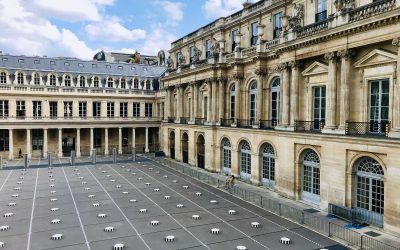There are 11 public holidays in France. But there are a lot more French national holidays, celebrations, and traditions during the year that don’t necessarily come with a day off.
And having lived in Paris for over 10 years now, I’ve noticed that there is a particular rhythm dictated by the calendar to French people’s lives, much more so than we have in North America.
Whether it is a jour férié (meaning “public holiday” or “bank holiday”) or not, there are certain events in the french calendar that makes everyone sit up and take notice.
French people have a lot of holidays from work, and the kids have even more holidays than the adults. This means there are a lot of periods when everybody has more of a tendency to be on holiday than others.
And even if it isn’t a day off, there are plenty of other quirky French celebrations involving crêpes, parties with neighbors, festivals of music, etc. It is part of the culture and the fabric of French society.
And you combine that with each significant day having its own tradition, and you have the French way to celebrate, if you will. So let’s uncover the main French national events and holidays, shall we? Allons-y!
1. Janvier – January
i) Jour de l’An – New Year’s day
- Public holiday in France: Yes
- When: January 1st
Like the rest of Europe and the Anglo-saxon world, France follows the Gregorian calendar, meaning you get to go around at midnight on New Year’s eve wishing everybody Bonne Année and have a holiday.
French people will usually continue greeting people Bonne Année the first time they see them that year, even if they are deep into January. And along with Bonne Année, you can also add Bonne Santé, meaning “Good health”.
ii) Jour de l’Epiphanie – 3 Kings Day
- Public holiday: No
- When: First Sunday of the year
Three Kings day is not a public holiday but it is an important day in the French calendar. This is the day (or week) when French people get to pig out on a pastry from Brittany called the galette de roi.
The pastry usually has a tiny figurine called a feuve is hidden by the baker within the galette de roi, and the person who finds it is crowned King or Queen for the day.
iii) Winter Sales
You might think it is dreary to visit Paris in January, but the official Winter sales period (les soldes d’hiver) will start the 2nd week of January for four weeks. Who says there is nothing to celebrate in January?
It is a very busy time in stores, so be prepared to have your elbows out while shopping!
iv) Carnival de Limoux
It is the start of the carnival season in France with one of the oldest carnivals being held in Limoux in the Occitanie (near Toulouse and Carcassone). It actually lasts 3 months from the end of December to the end of March/start of April.
v) Truffle Festival in Sarlat
Each year in mid-January, the town of Sarlat-la-Canéda in the Dordogne region hosts a famous festival celebrating the truffle.
With music and festivities, along with markets selling fresh truffles and related artisanal products, you can learn everything from how to find and pick truffles to how to cook them.
vi) La Grande Odyssée Savoie Mont Blanc
La Grande Odyssée Savoie Mont Blanc is an international sled dog race spanning 900 kilometres (560 miles) in French Alps in the former duchy of Savoy (around Chambéry).
Over 50,000 visitors head over every year to enjoy the festivities that include everything from pistes de luge to building igloos. You can read more about visiting France in January here.
2. Février – February
i) La Chandeleur – Candlemas Day
- Public holiday: No
- When: 2 February
Like on 3 Kings Day, Candlemas is another Catholic religious event and French celebration that isn’t a public holiday, but it is nonetheless important. And that’s because it is the day to invite your French family and friends over for crêpes.

This is not to say French people don’t eat crêpes all year long, but Chandeleur is a bit of a crêpe-athon. And while crêpes are not usually served on Valentine’s day, they are still ubiquitous all month long.
☞ READ MORE: Crêpe Suzette: To Flambée or not to Flambée?
ii) Winter School Holidays
School is off for 2 weeks all across France at the end of February, beginning of March. The weeks are staggered based on the zone that the region falls into.
Two weeks off of school that means that it is time for the requisite family ski holiday! If you do plan on coming to the French Alps to ski, I recommend checking when the school holidays are and planning the best time to hit the slopes.
If you are not a skier, not to worry, there are plenty of other places to visit in France in winter. You can read more about visiting France in February here.
iii) Carnival de Nice
The Carnival de Nice is the biggest carnival in France, held over two weeks in February and March . Located on the French Riviera, the parade features the city’s boardwalk Promenade des Anglais prominently. There are several events across Mardi Gras in the downtown of Nice, with the biggest highlights being:
- Carnival Parade – held during the daytime with large floats, dancers, acrobats, confetti and more
- Carnival Parade of lights – in the evening with large illuminated floats, visual animations of big screens, and fireworks
- Flower parade and the “battle of the flowers” – large floats covered with flowers and costumes models throwing flowers into the crowds.
The original parade dates back to 1873, with the flower parades being added on in 1876. You can read more facts about Nice here.

3. Mars – March
i) Fête des Grands-Mères – Grandmother’s Day
- Public holiday: No
- When: 1st Sunday in March
Unlike North America which celebrates both grandparents together in September, in France, Grandmother’s day is in March, while Grandfather’s day is in October. It was a holiday created in 1987 for commercial purposes by the coffee brand Grand’Mère, but nevertheless French people do oblige by sending Mamie a bouquet of flowers.
The usual flowers offered are those in season such as the lys or tulips, usually in white or pink. Avoid yellow or red as those colors are meant to signify passion. You can read more about France in March here.
ii) Mardi Gras in Nice and Menton
The Carnival de Nice is the biggest carnival in France, held over two weeks in February and March. Located on the French Riviera, the parade features the city’s boardwalk Promenade des Anglais, with floats, bands and music over several days.
Another famous carnival in France at around the same time is the Fête du Citron (Festival of the lemon) in Menton and is to mark the end of winter. With floats made out of lemons and a party atmosphere, this festival attracts over 200,000 people a year.
The festival dates back to 1875, and even Queen Victoria of the UK was known to have made a visit.
iii) Fêtes des Violettes
A few miles away from the coast in Provence is the small town of Tourrettes-Sur-Loup which is known for its violet confectionery and artisan shops.
Every March, this small medieval village has a big violet celebration, including farmers’ markets, parades, and even a battle of the flowers.
iv) Sarlat Fest’Oie
If you enjoy foie gras, head to Sarlat in the Dordogne where the first weekend of March a celebration of foie gras is held. Oie translates to goose in French.
With farmers’ markets selling foie gras, cooking demonstrations, and other workshops, the festival of foie gras is an interesting way to learn about this traditional French delicacy.
4. Avril – April
i) 1er Avril – April fool’s day
April fool’s day doesn’t have a special name in French; which is not to say that it is not celebrated. Known as “1er avril” or “premier avril“, it simply means the 1st of April.
Nonetheless, it is believed that the tradition of merriment on April Fool’s actually originated in France, when the French King Charles IX decided to move the start of the new year from the end of March, to the start of December.
Today, the favorite prank of French children for April fools is stick a “poisson d’avril”, meaning a paper fish, on the back of the person they are trying to prank. You can read more about April fools in France here.
ii) Lundi de Paques – Easter Monday
- Public holiday in France: Yes
- When: Based on the Jewish calendar, Easter falls on the Sunday after the Passover full moon
While Good Friday is usually the public holiday in North America, in France it is Easter Monday. Only Alsace and Moselle have Good Friday off as well.
An interesting note is that there is no Easter Bunny in France. Lapin (rabbits) are considered a delicacy so it would be difficult to explain to your little Frenchie why you are eating that cute little rabbit who gave you some chocolate eggs.
iii) Spring School Holidays
It has been 6 weeks since the Winter school holidays, so time for school to be out for 2 weeks again!
No one has any idea what to do with the kids, so its off to the grandparents or the centre de loisirs (meaning “leisure center”). You can read more about France in April here.
5. Mai – May
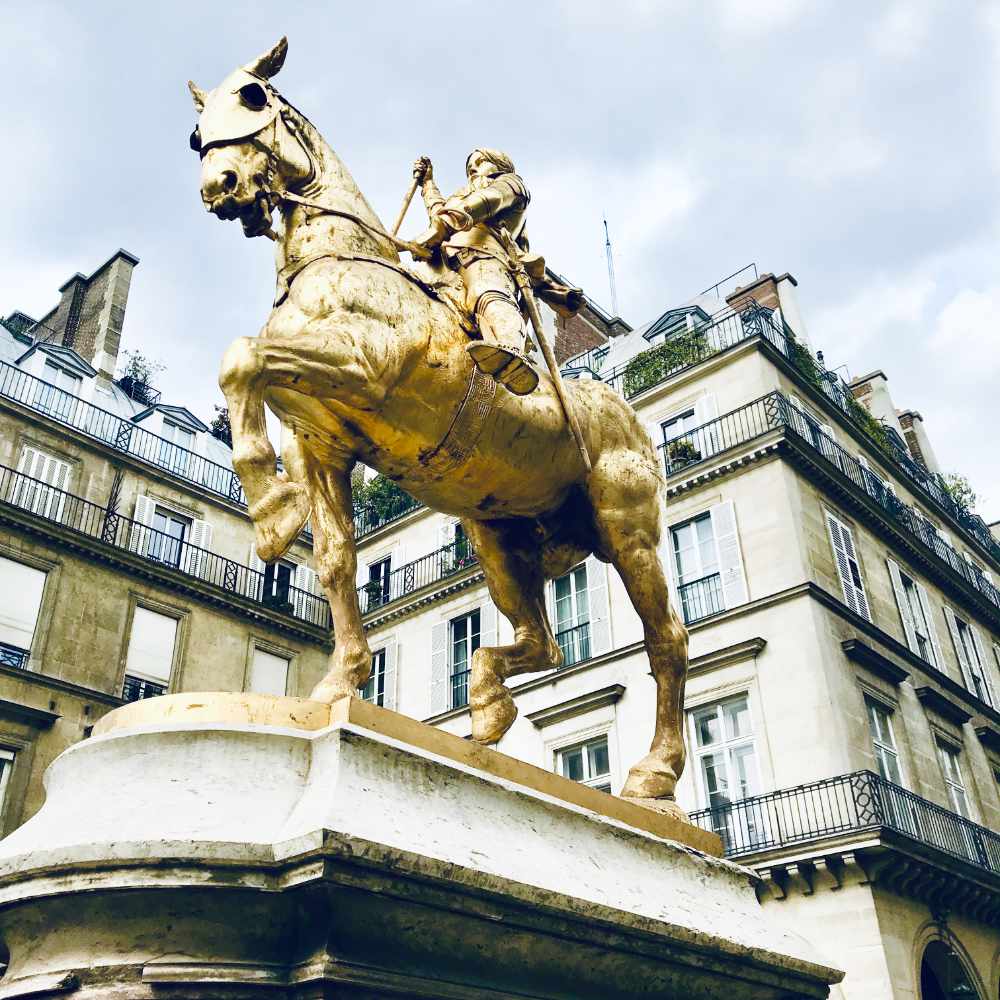
With several public holidays in May, this is usually the month where the average French worker does the “faire le pont“. Which is to say, if the public holiday falls on a Tuesday or Thursday, they will take a vacation day on the Monday or Friday for an extra-long weekend.
Don’t expect to get too much work done in May, because 1/2 your co-workers will probably be on holiday.
i) Fête du premier mai – Labor day
- Public holiday in France: Yes
- When: May 1st
Labor day in France is not in September, but in May. It is a public holiday, and in Paris you will see large demonstrations and protests by unionists for May Day. You can read more about employee benefits in France here.

Even large museums like the Louvre will be closed on May 1st so check on their website if you are planning a visit.
In addition, the muguet flower which is known in English as the lily of the valley, is traditionally offered in France at the start of May as a token of the coming spring and to bring good luck.
ii) Jour de la Victoire en Europe – Victory in Europe day
- Public holiday in France: Yes
- When: May 8th
The end of World War II in Europe is an important holiday in France. With older generations still able to recount the wartime horrors in France, the day is marked with military memorials with foreign leaders.
iii) Jour de l’Ascension – Ascension Day
- Public holiday in France: Yes
- When: Thursday, the fortieth day after Easter
It is the 3rd public holiday in May, so many people “faire le pont”, which is take a “bridge” vacation day to string together a longer holiday. If you are a business trying to get some work done in May, be prepared to have a good percentage of your coworkers on holiday.
iv) Fête des Voisins – Neighbors’ Day
- Public holiday: No
- When: Last Friday in May
It is not a holiday, but an evening when you are supposed to get together with the neighbors in your building for a moment of conviviality. It is usually organized in potluck style, with everyone bringing a little something.

v) Fête des Mères – Mother’s Day
- Public holiday: No
- When: Last Sunday in May, except if it conflicts with Pentecôte (decreed by French government
French people love their moms, too so it is Mother’s day! The standard greeting to your French maman is Bonne fête Maman ! with flowers and/or some chocolates. You can read more about May in France here.
6. Juin – June
i) Lundi de Pentecôte – Pentecost
- Public holiday in France: Yes
- When: 50 days after Easter
Another Catholic holiday, which is also called Whit Sunday in the U.K. In France it is mostly just a holiday in June to recover after all the May holidays, before the big summer vacation starts.
ii) Fête de la Musique – Festival of Music
- Public holiday: No
- When: June 21st
It is not a public holiday, but it is a day to mark on the calendar nonetheless. All over France, and especially Paris will turn into a giant music street festival. Small bands, musicians, and just about anyone and everyone will take to a street corner to play their favorite hits.
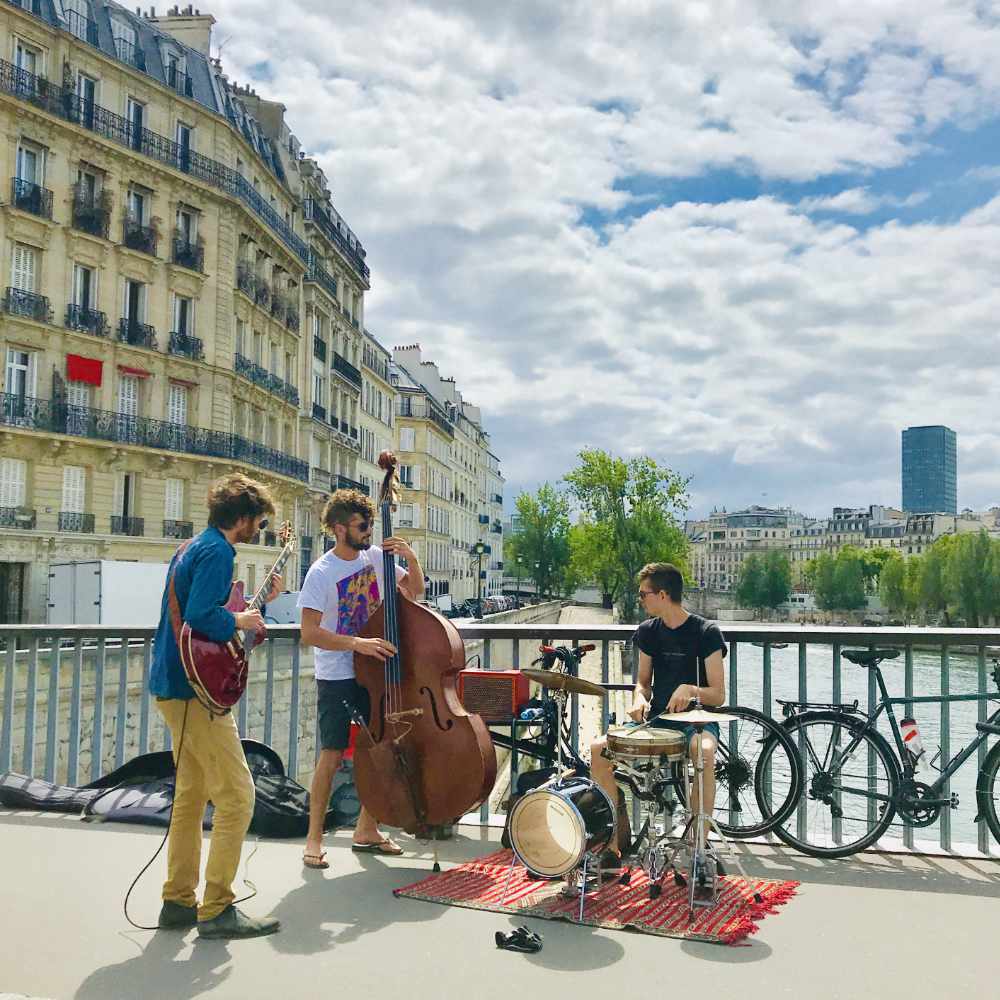
The party goes on late into the night in Paris, so wear your walking shoes so that you can band hop with the locals.
iii) Summer sales
If you missed the soldes d’hiver (winter sales) back in January, have no fear, it is time for the soldes d’été! The summer sales start in the last week of June and run for 4 weeks during the dog days of summer. You can read more about June in France here.
iv) French Open Tennis Tournament (Roland Garros)
If you are in Paris, you can catch the final rounds of the Roland Garros French tennis open which began in late May and wraps up in early June.
The tournament is named after the French aviator Roland Garros, and is played at Stade Roland Garros near Bois de Boulogne in the 16th arrondissement of Paris.
7. Juillet – July
i) End of School
Surprisingly, School in France doesn’t end until the 1st week in July, although older children (high school) have usually finished their annual exams and are in cruise control. There is not much that goes on in school after the end of June.
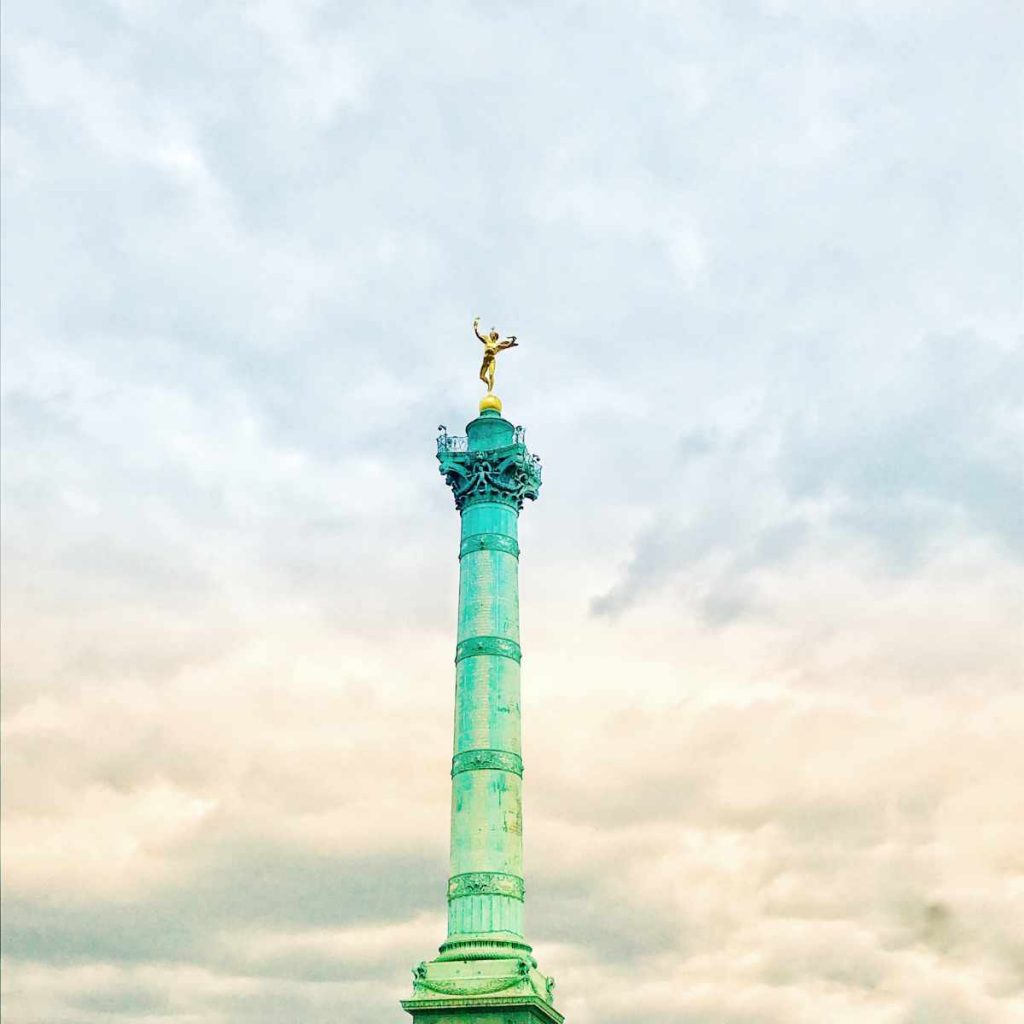
ii) 14 Juillet – Bastille Day
- Public holiday in France: Yes
- When: 14th of July
Interestingly, the date of the French Revolution (in 1789) is simply called by its date, Quatorze Juillet, and not Bastille Day as anglophones call it. The term “Bastille day” doesn’t really mean anything to the French.
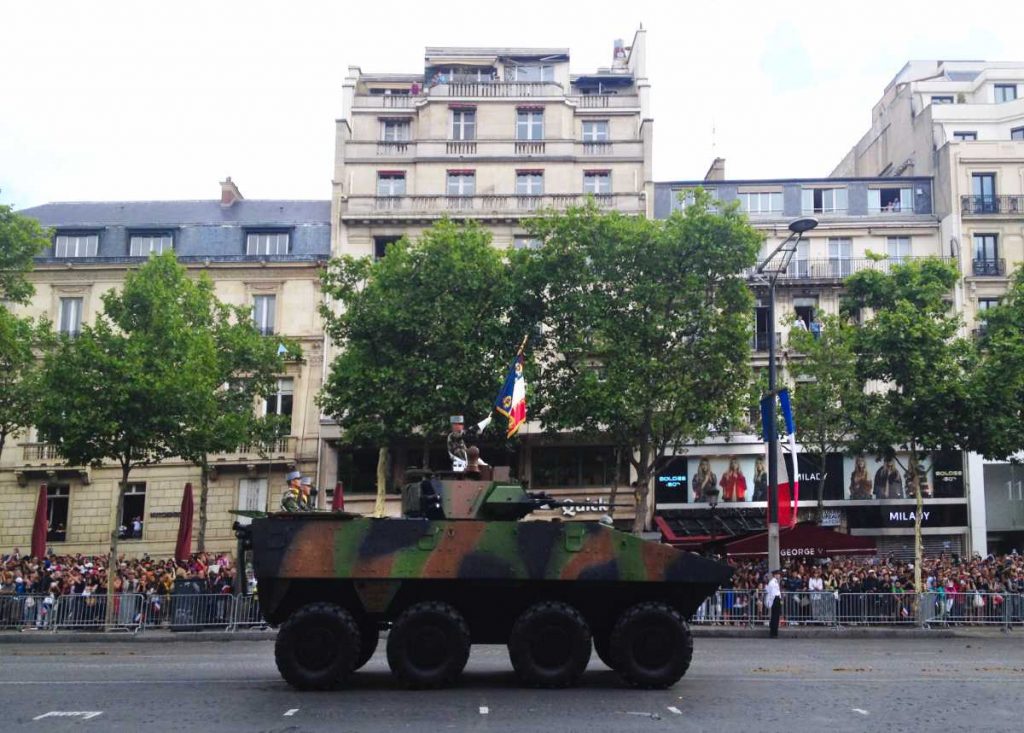
The day is usually marked in Paris by a giant military parade with tanks, military regiments, horses, etc. The President of France usually hosts a foreign leader and gives a speech proclaiming “Vive la France!” and with the playing of the national anthem.
The crowd favorite, however, is always the traditional flyover by the different types of aircraft in the French Air Force. (Note there are no celebrations around the actual Place de la Bastille.)
Pro-tip: You will usually hear them practicing overhead on July 13th, from over La Défense over to the Champs Elysées and back.
You can read more about how French people celebrate Bastille day here.
iii) Juilletiste – July holidaymaker
There are two types of people in France: the Juilletiste and the Aoûtien. Those who take their annual 3 weeks off in July, and those who do so in August.
If you are impatient, you take off July, when prices are slightly cheaper. Otherwise, you try to maximize your summer in the city, waiting for your August holidays. You can read more about July in France here.
iv) Le Tour de France
The most prestigious bike race, the Tour de France starts on the 1st of July and runs all through the country. It starts at a different location every year and consists of 21 stages, each a day long, over the course of 23 days.
The final stage and grand finalé always in Paris, with the winner awarded the yellow jersey on the Avenue des Champs Elysées in front of cheering crowds.
8. Aout – August
i) Jour de l’Assomption – Assumption Day
- Public Holiday in France: Yes
- When: 15 August
For Catholics, this is the day when the Virgin Mary goes to heaven. For most French people, it is a day off in the middle of August that doesn’t count against their work-vacation allotment.
It was Napoleon Bonaparte in 1802, who established these religious days as national holidays, one for each season:
- Ascension in spring (May)
- Assumption in summer (August)
- All Saints in autumn (November)
- Christmas in winter.
ii) Festival Interceltique in Lorient
Every year the town of Lorient in Brittany has a festival owing to its Celtic past, that attracts over 700,000 festival-goers from all over Europe. The festival is usually held in the 2nd week of August, with Celtic music and marching bands on feature.
With plenty of good food and dancing, this is a real celebration of Gaul and Celtic culture in a land where the Breton celtic language is still spoken.
iii) Aoûtien – August Holidaymaker
It is the dog days of summer in France when most people take their 3 weeks off. (Remember, most places in France don’t have airconditioning.) Cities like Paris are empty, abandoned to the tourists.
If you are a July holidaymaker who has returned to work in August, you are expecting very slow days at work, where almost everything is at a standstill.
In addition, if you are in a larger city, you may find that outside the tourist places that are open, many of the restaurants and shops nearby are also on their annual holiday.
iv) Fête du Jasmin in Grasse
The perfume town of Grasse celebrates the Fête du Jasmin or La Jasminade every August, which is always fun to watch.
Decorated floats drive through the town, with people throwing flowers into the crowd. Garlands of jasmine decorate the town center, and there are also fireworks, parties, and street performers.

9. Septembre – September
i) Jour de Rentrée – Back to School Day
- Public holiday: No *
- When: First Monday in September
The big day back to school! And for adults to get back to the grindstone! If there are projects at work that you have been putting off all summer, you now have to get back to it. (Read more about la Rentrée.)
* Note: The day itself is not a holiday, but most companies have negotiated with their union to provide the day off for parents of small children. French parents usually take the day off to drop their kids off school, (though you do not get 2 days off if you have 2 small children!)
ii) Journées du Patrimoine – Heritage Day
- Public Holiday: No
- When: 3rd weekend in September
This is not a day off, per se, but rather a weekend to go behind closed doors. Most major government buildings and institutions will open their doors to visitors all weekend long. Lines are usually long for favorites such as the Palais Elysées (official residence of the French President), Assemblée Nationale, and the television studios of France 2 (the French equivalent of the BBC).
If you plan on going to any of the hotspots, be prepared to line up as early as 6am, if not earlier. You can read more about France in September here.
iii) Braderie de Lille (Lille flea market)
With over 10,000 exhibitors in the streets, the city of Lille in the north of France hosts the world’s largest flea market. It is usually held the first weekend of September, attracting millions of people every year.
It is believed that the first annual flea markets in Lille date back to 1127 and is a big festival in the city. With various stands, local foods, a half-marathon, and parties late into the night, there is something for everyone.
iv) Féria du Riz in Arles
If you enjoy a good paella, you will want to head to the Camargue and the city of Arles near the French-Spanish border. It is usually held in the 2nd week of September (as well as in April) and is a bull-fighting festival that takes place to celebrate the rice harvest.
The rice used in a paella is a short grain rice that is grown in the department of the Camargue which has a strong Spanish influence.
v) Fête de la Gastronomie
A newer festival around France is the Fête de la Gastronomie. It is an initiative of the Ministry of Crafts, Trade and Tourism launched in 2011, and is celebrated in the last week of September.
It takes place throughout France and is meant to promote the French culinary heritage. Some smaller towns and villages will promote their local fares, but it has yet to catch on with restaurants in larger cities like Paris.
More common is local and artisan food markets that will hold special events to promote their produce. Lyon, which is considered the French capital of gastronomy, holds a street food festival with tastings, picnics and other festivities.
vi) Montgolfières in Rocamadour
In the last weekend of September, a spectacular sight takes place in Rocamadour, a small clifftop village in south-central France.
Around 30 hot air balloons take flight over the valley to pay tribute to the inventors of the Montgolfières, the Montgolfier brothers who were from nearby Ardéche.

10. Octobre – October
i) Fête des Grands-Pères
- Public holiday : No
- When: 1st Sunday in October
The grandparents may not be celebrated together, but Grandfather’s day only dates back to 2008. Being a newer holiday, there is no particular tradition of gifts for Papy, so you can wish him as you please.
ii) Fall School holidays
School may have just started in September, but 6 weeks after the 1st day of school, it is school holidays again! Kids are off school for 2 weeks from the end of October to the start of November, depending on their region. Time for a fall holiday somewhere, if the parents can afford to take some time off.
French adults usually have on average 6-8 weeks holiday, but it is not enough to make off for all their kids’ school holidays. Time to send the kids to the centre de loisirs (leisure center) or call in the grandparents!
iii) Nuit Blanche in Paris
Inspired by the 1989, Helsinki’s Night of the Arts, Nuit Blanche in Paris is is a special event when art takes over the city. Every art gallery and museum is open until midnight or later and artists are invited to install their creations on the street for passersby and art lovers everywhere to admire.
Nuit blanche translates to “white night”, and is the French expression for the all-nighter. The French nuit blanche has now been exported to over 120 countries across the world.
iv) Fête de la Bière – Oktoberfest in Alsace
The region of Alsace has been fought over by France and Germany for centuries. It only finally became part of France after WWII. So it stands to reason that the region would keep some of its German traditions, among them being Oktoberfest.
It is held in Strasbourg and Colmar and various small villages in the area with large beer gardens with plenty of singing, sausages, and sauerkraut. You can also visit the Alsace wine route at the same time, which should just be wrapping up their yearly wine harvest.
v) Lumière Film festival in Lyon
Celebrating the Lumière brothers who invented the cinema as we know it, is the Lumière film festival that is held every October in Lyon.
While smaller than the Cannes and Deauville film festivals, it is still features hundreds of French and foreign films.
vi) Halloween
As I mentioned, Halloween on October 31st is not really celebrated in France. The 1st day of November, or All Saints’ day, is a public holiday however.
You will not see kids going door-to-door trick-or-treating. And even if they did, there would likely be no candy. French neighbors don’t stock up on candy on Oct 31st, so I know other North American moms who go and drop off little bags of candy at their neighbors to subsequently hand out.
There are a few small parties that are held among expat groups, but certainly not the big celebration that you would see in North America. You can read more about Halloween in France here.
vii) Fêtes des Sorcières
These days, several cities in France celebrate the Fête des Sorcières, festival of witches towards the end of October. If you are interested in attending, the biggest ones are in:
- Lille (Haut de France)
- Chalindrey (Grand Est)
- Morbecque (Haut de France)
- Pennes Mirabeau (Provence)
You can read more about France in October here.
11. Novembre – November
i) La Toussaint – All Saints’ Day
- Public Holiday in France: Yes
- When: November 1st
Halloween on October 31st may not be celebrated in France, but its historical cousin All Saint’s day is.
Known as Toussaint in French, it is an occasion to remember the dead. Chrysanthemums are laid on gravestones of the dearly departed. (For those superstitious, these flowers are never offered to the living.)
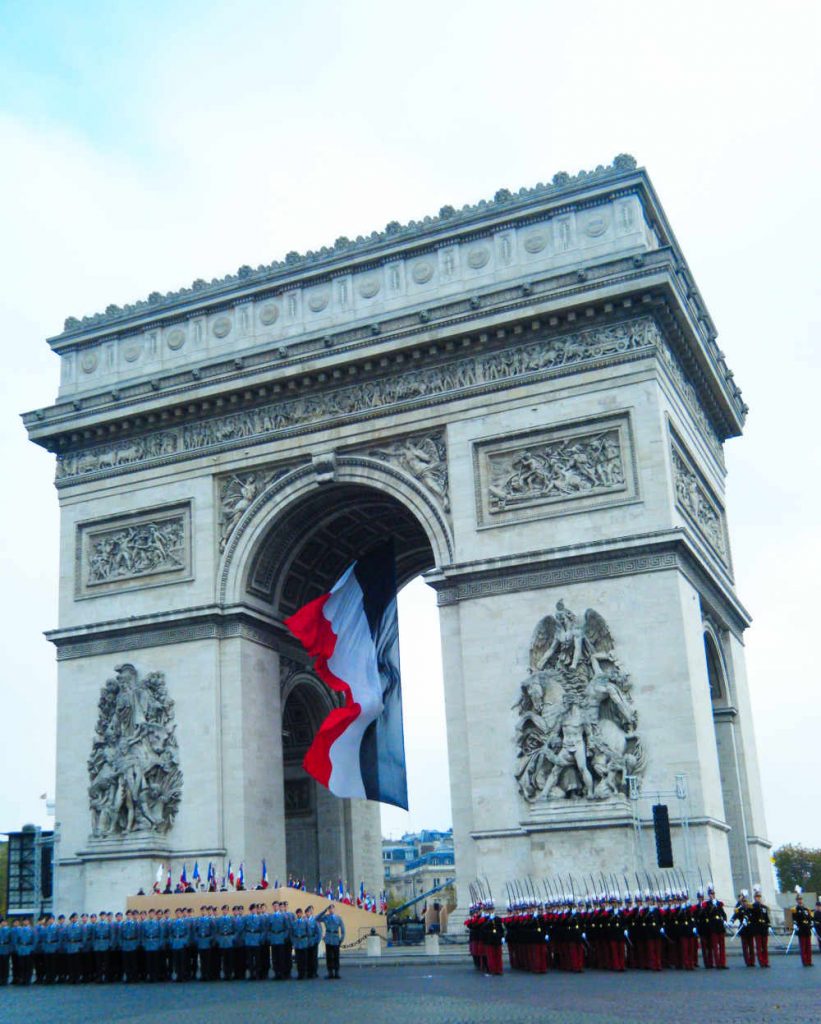
ii) Jour anniversaire de l’Armistice – Armistice Day
- Public Holiday in France: Yes
- When: November 11th
The anniversary of the end of the First World War is marked with solemnity here in France. Having been invaded in both WWI and WWII, the day is a national holiday with remembrance services being held on the Arc de Triomphe and Champs Elysées.
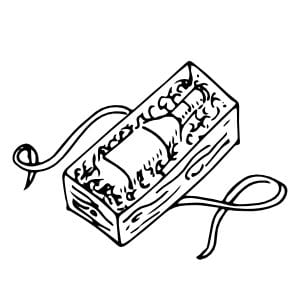
iii) Jour de Beaujolais Nouveau – Beaujolais Nouveau day
- Public Holiday in France: No
- When: 3rd Thursday of November
If you have been in Paris on the 3rd Thursday of November, you will have seen the signs announcing that the “Beaujolais Nouveau est arrivé!” (meaning “the Beaujolais Nouveau has arrived”). One of the quirkier French celebrations, this one is all about the wine harvest.
The Beaujolais Nouveau is a young wine that doesn’t need to be aged, so local vineyards would race to press their grapes into wine and rush it up to Paris to be the 1st.
A marketing strategy but one that worked, because Beaujolais Nouveau is now celebrated in many other cities like London and New York as well.
iv) Fetes des Vins de Chablis
The village of chablis in the Bourgogne (Burgundy) festival has its annual festival to celebrate the chablis wine harvest in November. The chablis is a white wine made from the Chardonnay grape.
Local producers gather in the heart of the village to offer tastings and enter their wines in local competitions under a festive atmosphere.
v) Fête du Hareng in Normandy
If you like fish, several towns in Normandy like Dieppe, Fécamp, Tréport, and Saint-Valéry-en-Caux celebrate the Fête du Hareng (Herring festival) every November.
Considered the “King of Fish”, it is a big part of the culture and economy in Normandy. As the French history lesson goes, it was 1429 during the 100 year war. The city of Orleans was under attack and besieged by the English.
Somehow, the French managed to cut off the food supply wagons of herring destined for the invading English, and after a famous battle, managed to liberate the city. All because of the herring.
You can taste it in all its forms during the festival, but the classic version is herring marinated and grilled, with a little lemon or white wine.
vi) Festival de la Soie (Silk Festival) in Lyon
The city of Lyon used to be known for its silk industry, and this savoir faire is still celebrated with Festival de la Soie every November. Local exhibitors will present original and modern designs demonstrating their craftmanship and creativity.
The show attracts professionals and amateurs who wish to participate in demonstrations and learn about these age-old techniques.
vii) Salon du Cheval de Paris
Salon du Cheval de Paris (Paris Horse Show) is an annual event dedicated to horses and riding with over 450 exhibitors and 2,000 horses. The event occurs each November, gathering around 150,000 visitors over ten days.
You can read more about visiting France in November here.
12. Décembre – December
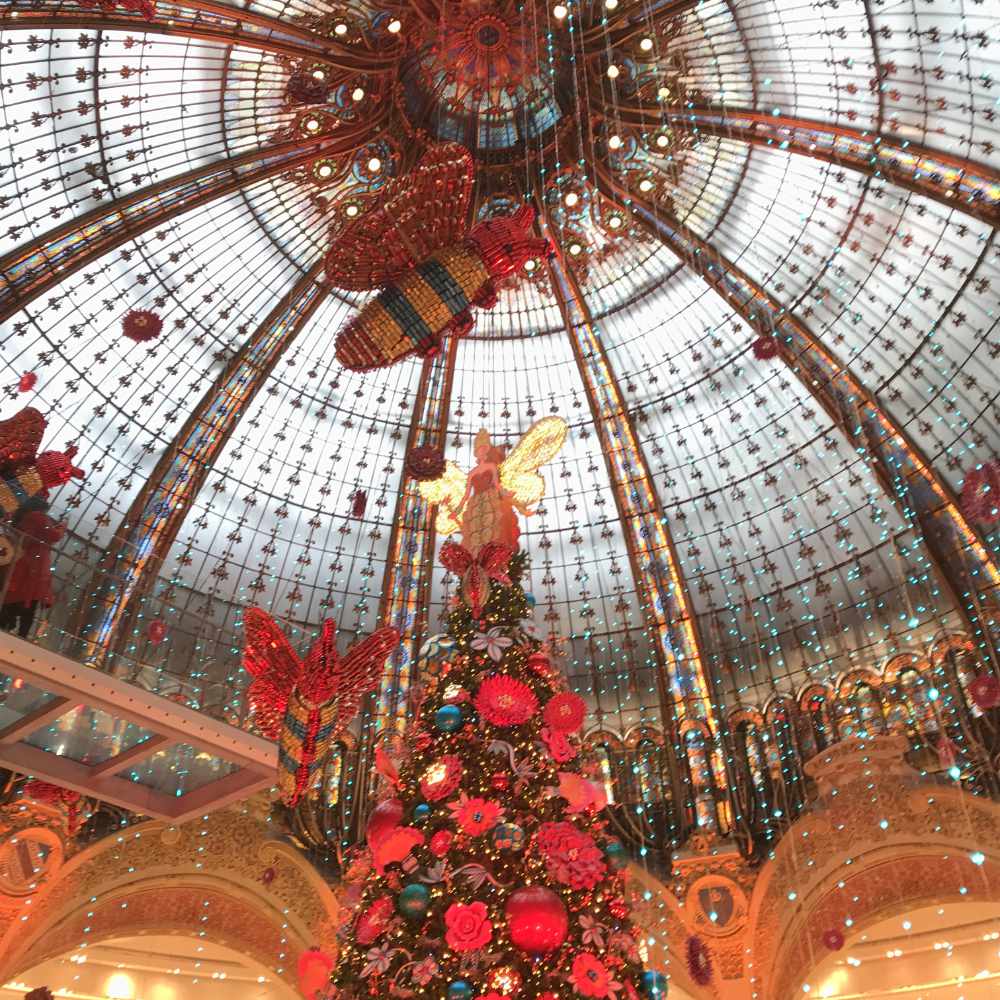
i) Fête des Lumières in Lyon
The festivities start in early December when the city of Lyon lights up its major landmarks with a magnificent festival of lights. Special shows with music and illuminations are held every night for 3 days in the 2nd week of December, attracting millions of visitors.
ii) Foire de la Saint André in Annecy
Held the first Tuesday of December in Annecy, the Fair of Saint Andre dates back over 5 centuries. More than 1,100 traders covering over 5km over the city set up shop, attracting tens of thousands of visitors.
iii) Réveillon de Noël – Christmas Eve
- Public holiday: No
- When: December 24th
Schools are usually closed during this period (see school holidays below), but most businesses are open, with offices usually letting people off work at 3-4 pm. Traffic is usually quite crazy in the Greater Paris Area at this time.
iv) Jour de Noël – Christmas Day
- Public holiday in France: Yes
- When: December 25th
France is a secular country, but Christmas is Christmas. There are many French Christmas traditions, but it is the traditional dinner that is the most important.
A French Christmas family dinner will on average lasts 4-5 hours. (Time measured by my own statistical study, of course.) It usually takes place on Christmas eve or Christmas day lunch and will feature everything from seafood to foie gras, several different types of wine and champagne, and much much more. Better have some stretchy pants handy!
☞ READ MORE: Top French Christmas carols that will fill you with some festive spirit
Note: there is no Boxing Day in France on December 26th because as mentioned above, the official Winter sales period (les soldes d’hiver) will start the 2nd week of January.
v) Marché de Noël
If you live in France, you know Christmas is coming once you start seeing the booths being installed in your town or neighborhood.

The most famous Marché de Noël in France is the one in Strasbourg, but the one next to the Champs Elysées in Paris is not too shabby either.
With small rides, Christmas trees for sale, and everything from cheese, meats, lavender products, and any other artisanal product you can think of, these little Christmas markets will put a smile on anyone’s face.
Enjoy a raclette cheese sandwich and a vin chaud (or a non-alcoholic version) while you do your Christmas shopping. You will also find many towns setting up small ice skating rinks outdoors over the holiday season, which are usually offered for free to small children.
vi) Festive Shop windows
Many of the large department stores, especially the ones in Paris, will have elaborate festive windows that are sure to please young and old. Shops like Galerie Lafayette and Printemps in Paris are known for their custom holiday windows, and it does get quite crowded with children.
Special Christmas offers are sometimes also on display, although the big sale season is usually in January.
vii) Christmas School holidays
Well it is Christmas and New Year, so time to give everybody some time off! The last week of December and 1st week of January (2 weeks) are usually off for all school children.
Time for more help from the grandparents. You can read more about December in France here.
viii) Réveillon du Nouvel An – New Year’s Eve
- Public holiday: No
- When: December 31st
New Year’s eve is also known as la Saint-Sylvestre after Pope Sylvestre I. For most local Parisians, the tendency is to go to someone’s house for a party rather than go on the Champs Elysées (which is reserved for tourists), or an expensive dinner out.
Note: There are no fireworks at the Eiffel Tower, the festivities are on the Champs Elysées. So go for an apéro-style drinks and dinner with friends, and then counting down late into the night… It is New Year’s Eve, baby!
How to say “Holiday” in French?
The word for public holiday is “Jour Férié” meaning “day off”.
How to say “Happy Holidays” in French”?
To generally wish someone “happy holidays” when they are going off on vacation, the phrase in French is “Bonne Vacances“. However, if you are saying “happy holidays” to wish someone for the Christmas holidays, then the phrase in French is “Joyeuses fêtes“.

So are you feeling festive yet, after all those French celebrations? If you enjoyed this article, you may want to read more about the French revolutionary calendar. (Hint: the French tried to make a week include 10 days instead of 7, and 3 weeks in a month instead of 4. You can guess how it turned out.) A bientôt!



